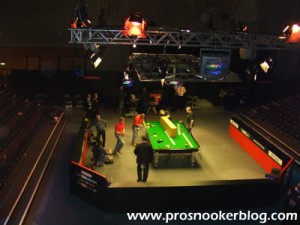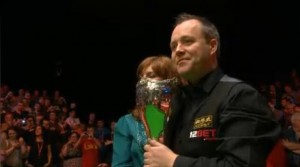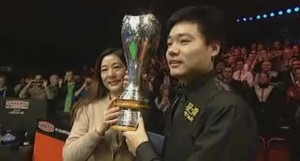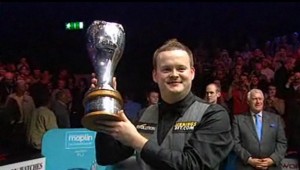
As indicated by Mark Joyce during his recent interview here at PSB, World Snooker have today confirmed the disappointing news that from this season the UK Championship will be contested over the best of 11 frames up to and including the quarter-finals, as opposed to the usual 17. Click below for a few of my ramblings on the subject not just of the UK Championship, but also the issue of longer formats v shorter formats in general…
As those of you who have been reading for a long time or follow me on Twitter will be well aware, I am not quite a staunch traditionalist, but I am probably about 3/4 there and if given the choice between a longer or a shorter format tournament, would generally opt for the former. As ever in life however, things are never black and white and that is certainly applicable to this decision.
As you may have seen already today, Snooker Scene’s David Hendon has already offered his thoughts on the format change, quite rightly looking at the commercial reasons behind the decision and the cost-cutting element of the switch.
From my point of view however, as a snooker fan I want to take a look at the format debate from a sporting angle as for whatever else this blog has become during the last few years, it remains ultimately a fan viewpoint on the sport and that is how I am going to look at it.
So turning to the respective arguments…

In favour of the shorter formats
Despite the negativity towards the seemingly inevitable erosion of the longer format matches in the game these days, it should be noted that there are those who prefer shorter-format tournaments and will be in favour of a move such as this.
The suggestion is that with so many competing sports and forms of entertainment available these days, fans do not want to sit through 17, 19, 25 frames to find a winner. The comparison with Twenty20 cricket is often trotted out as being an example of how shorter-format tournaments may be the way forward in order to generate new interest in the sport.
Furthermore it is positive that while matches are being shortened, the game of snooker remains unaltered, no shot clocks or ball in hand rules being introduced which would have a far greater affect on the sport than merely reducing the total frames played.

It is also arguable that the most entertaining part of any match is its climax, so whether the match is 4-4 or 8-8, ultimately the drama is going to be the same and by shortening the format we are merely hastening the journey to that point. Similarly, it is also true to say that fans attending at the venue will now be able to see a match through to its conclusion as opposed to perhaps seeing the first session of a match and being unable to hang around for the finale.
Another plus point is that due to the shorter format here at the UK Championship and also that employed earlier in the year at the Welsh Open, the need for fewer tables means that each match at the venue will now be televised, in contrast to the previous situation where matches would be played on outside tables away from the cameras.
Finally nobody likes to see one-sided matches and over a longer format, particularly with an uneven contest, there is a greater risk of this happening than over a shorter format where such matches will be won more quickly, allowing spectators to move on to another potentially more exciting match.
In favour of the longer formats
While much of the above is understandable however, there are also a number of arguments as to why the move is a negative one and first and foremost is the fact that the longer stories tell a story that is impossible to match in the shorter contests.
The examples of this are countless, for example Judd Trump’s missed blue against Stephen Lee at the World Championship qualifiers which saw a commanding lead turn into a 10-8 defeat, or Mark Joyce’s incredible match with Marcus Campbell in qualifying for Telford last year which saw him lead 5-3 before trailing 8-5 and eventually coming back to win 9-8. Even this year at the World Championship qualifiers, players such as Jamie Jones, Jimmy Robertson, Liu Song and Steve Davis were all able to fight back from several frames behind to win in dramatic circumstances which would not have happened in a best of 11.
The twists and turns of the longer format, the pressure involved and the slow-burn drama that drew me into what I would call ‘proper’ snooker are certainly diluted during the shorter formats, even during best of 11’s which let’s not forget is what we are talking about here, not really short formats such as at the World Open. The true tests of the players come at events such as the UK over matches over a longer distance and ultimately as a child growing up, they are the events that attracted me to the sport.

As well as being a disappointment from a drama point of view, it is also arguable that what is the second most prestigious ranking event title on the calendar has now been devalued to some extent. Indeed I have seen it described today on another site as now being ‘another run of the mill’ tournament.
While this is not quite true for reasons that I will come to shortly, I feel that for all of the cries for increased variety on the calendar, the change does go against this ideology. In the past when I have compared shorter format matches (eg those at the World Open, PTC), unfavourably compared to those played at the UK and World Championship, on Twitter, a reply that I have often had is that variety is positive and it is good to see different things being tried.
Personally I feel that this misses the point to some extent because frankly there are far more best of 7 or 9 tournaments on the calendar these days than there are longer formats so it is a shame to see what few longer format events there are these days brought into line with the others.
I am all for variety and agree entirely that all formats (so long as they involve 15 reds anyway), have a place in the game, but this has to include the longer matches too. I have spoken to far too many fans both at venues and online, as well as those within the game to believe that there is such a lack of demand for longer matches as is sometimes made out. It has to work both ways.

The argument that closer, shorter matches over one session are more entertaining than one-sided longer contests perhaps has something to it, but I would submit is ultimately fairly weak as regardless of format, some matches are always going to be more entertaining than others. Yes a 6-5 would be preferable to a 9-4, but generally speaking a 9-8 would be preferable to a 6-5 in my opinion and for each of the comfortable matches, there is another classic to match.
At the risk of going off on something of a tangent, it could also be argued that the longer formats being a greater test of the players than the shorter ones, the rankings points tariff should now be adjusted to reflect this and in particular the now increasingly unique duration of the World Championship which now stands out more than ever as the true test of each and every main tour player.
Indeed what I feel is a flawed ranking points tariff in operation at present was already exposed last year as the winner of the World Open was awarded 7,000 points in comparison to 10,000 for the much longer World Championship. A decision apparently taken for commercial reasons as a requirement of the BBC televising the event, from my point of view I found it to be somewhat absurd. As far as I am aware, the UK’s despite being shorted in this way will continue to award the second highest amount of points for a single tournament with the winner receiving 8,000 which leaves it close to the Crucible in terms of ranking importance, despite the reduction in frames. Time to revisit this?
Returning to the matter in hand, there is also an argument that the shorter matches at the UK Championship do prejudice the interests of the less experienced players when it comes to the World Championship qualifiers as they will come into the event at a disadvantage when compared to those with greater experience.
My view
So where does this leave us? As is evident, from my perspective as a long-term snooker fan, from a sporting point of view there is no contest for me. My own view is that while there it is good to see a mixture of events of the calendar, when push comes to shove it is the longer format matches that really separate the men from the boys so to speak and that draw me to the sport. Both personally and from speaking to snooker fans, I do not believe that I am alone in having such a view and believe that there remains demand out there for longer format matches beyond the World Championship.

On a personal level I feel more involved in the longer matches and while thankfully the game of snooker remains unaltered (the day that they bring a shot clock into a major event won’t be pretty!), I do feel that the event has now been devalued to some extent. That said, the fact that it will continue to carry so many ranking points as well as the rich history associated with it means that it has not suddenly become worthless as some knee-jerk reactions have suggested.
Obviously though there are bigger issues than just sporting ones and I am not blind to those. Whether or not it is truly necessary from a commercial point of view, I don’t know. Frankly I am not close to being in possession of the full facts from my comfortable position in front of a computer screen so am certainly not going to suddenly lay into Barry Hearn who lets not forget has done so many positive things for the sport during the last 18 months.
Some have commented that this is all the more surprising given his intent to ‘leave the crown jewels’ when he first took up his post which is fair enough, but times change. Personally though if the choice was to get rid of a couple of PTC events and have the longer matches at the UK then I would prefer to do that in all honesty. If it was necessary to keep the BBC contract however then it is a different ball game unfortunately.
So to summarise, as I began by saying, from my perspective as a more traditional fan of the sport than most, it is disappointing to see the downgrading of what is one of snooker’s ‘big three’ tournaments and I can only hope that the World Championship is not similarly curtailed in future seasons.
